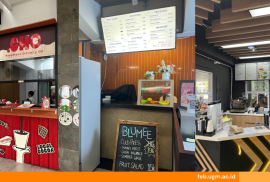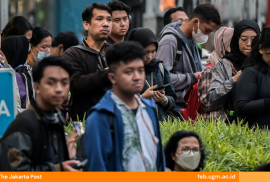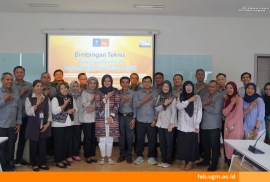On Saturday (16/04) the Center for Accounting and Regulatory Studies (PAKAR) from the Laboratory of Accounting, Department of Accounting Faculty of Economics and UGM which also collaborates with the Institute of Indonesian Chartered Accountants (IAI) Branch Yogyakarta held a Training of Trainer (ToT) on “PSAK 112: Waqf Accounting and SAWUT Application (Cash Waqf Accounting System).” This event also for the implementation of the Launching SAWUT-EDU (Educational Version of the Cash Waqf Accounting System). This event was held offline at the 8th-floor Auditorium of the FEB UGM Learning Center Building and also online using Zoom Meetings. This activity aims to provide knowledge and skills to all participants regarding waqf accounting and the use of the SAWUT application.
the activity was opened with remarks given by Gumilang Aryo Sahadewo, SE, MA, Ph.D. as Vice Dean for Research, Community Service, Cooperation, and FEB UGM Alumni. Gumilang stated that the UGM ENTROPY (Enhancing the Role of Islamic Philanthropy in Alleviating the Economic Impacts of Covid-19 Outbreak) led by Prof. Mahfud Sholihin, Ph.D. has produced outputs in the form of a literature review, a baseline to the beneficiaries of PBUT DIY, as well as the SAWUT application. SAWUT Education (SAWUT-EDU) is a learning media that can be used by nazhir, students, and lecturers. Gumilang emphasized that the product produced by the research team is something that FEB UGM hopes for because the research and education process is integrated with community service.
Meanwhile, Dr. Hardo Basuki, M.Soc., CSA. as the Chairperson of IAI DIY explained that accounting in the future will experience significant changes. In the 13th Congress, IAI created and formulated Prakarsa 6.1 which is a step forward for Indonesian accountants in preparing for a change in the future. One of his statements is that IAI will make adjustments to the accounting education curriculum and professional education that accommodates technological developments and current business disruptions. Basuki also emphasized that existing developments require accountants to be more technologically intelligent in doing their work. The implementation of the SAWUT application is expected to encourage the management of cash waqf to be more accountable and transparent.
The core of this event is the Training of Trainers (ToT) PSAK 112 which discusses Waqf accounting and SAWUT Applications. This event was moderated by Dr. Aprilia Beta Suandi, SE, M.Ec. as a Lecturer in the Faculty of Economics and Business UGM. Meanwhile, the speaker at this event was Prof. Mahfud Sholihin, Ph.D. as Professor of the Faculty of Economics and Business UGM, Chair of the IAI Syaria Accounting Standards Board, and IAEI Management. Gumilang explained that SAWUT-EDU is divided into 2, namely for learning to nazhir and learning for students in class. The difference between SAWUT-EDU for nazhir and students is that nazhir does not need to do journaling because the data entered on the form is automatically converted into a financial report. Meanwhile, students need to journalize debit-credit in the application to produce financial reports as a form of learning.
Gumilang also stated that in PSAK 112, financial reporting on waqf in foundations, organizations, and legal entities will produce separate financial reports so that they are not combined with financial statements belonging to the entity. There are two types of waqf, namely permanent and temporary cash. Transactions and events in waqf start from the delivery of waqf assets by wakif, acceptance by nazhir, management of waqf assets, development of waqf assets, to the distribution of benefits. There are several components of financial statements that are included in SAWUT, namely statements of financial position, detailed reports on waqf assets, activity reports, cash flow statements, and notes to financial statements.
Next is training to use SAWUT-EDU for lecturers, practitioners, and researchers. This training starts from creating an account and selecting a role to run. Next is to input data on waqf institutions in Indonesia. Transaction recording must also be carried out according to the date given through the transaction data menu. After the transaction data is inputted, it will automatically become an integrated financial report. With the training on the use of the SAWUT-EDU application, it is hoped that it can provide benefits to lecturers, researchers, practitioners, nazhir, to students to create accountability and transparency in financial reports for waqf.
Reportage: Merisa Anggraini




